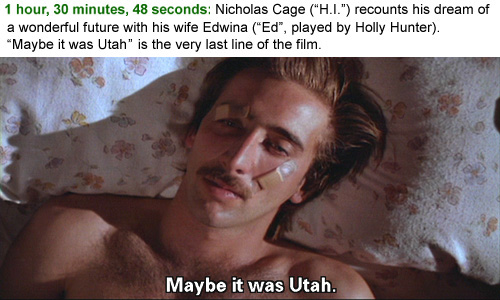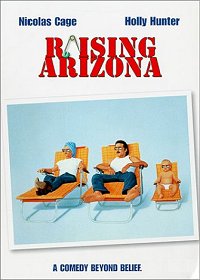


"Raising Arizona" (1987) was the Coen brothers' second feature film, after "Blood Simple" (1984). Sebsequent movies made by this critically acclaimed filmmaking team include: Miller's Crossing (1990); Barton Fink (1991); The Hudsucker Proxy (1994); Fargo (1996); The Big Lebowski (1998); O Brother, Where Art Thou? (2000); The Man Who Wasn't There (2001); Intolerable Cruelty (2003); The Ladykillers (2004).
In "Raising Arizona," Nicholas Cage stars as "H.I.", an essentially kind-hearted but perpetually unsuccessful small-time crook who falls in love with a police officer named "Ed" (short for "Edwina"), played by Holly Hunter.
Motivated by his attraction to Ed, Cage's character attempts to go straight after yet another jail term. He proposes to Ed, they get married, and after some happy time together Ed decides she desperately wants to start a family. When it turns out that the Edwina is incapable of conceiving a child, the couple decides to kidnap one of a set of quintuplets born to a wealthy furniture chain owner named Nathan Arizona (played by Trey Wilson).
Most of the movie depicts the misadventures of H.I. and Ed as they adjust to being parents, and then encounter various oddball characters who try to steal the baby from them in order to collect reward or ransom money. John Goodman and William Forsythe play two dim-witted crooks who are friends of H.I. but steal the baby from him. In the end, H.I. and Ed rescue the baby from a vicious and dangerous bounty hunter named Leonard Smalls (actor Randall 'Tex' Cobb), and they return the baby to his father.
"Raising Arizona" was noted for its ruthlessly hilarious depiction of rural Arizona.
In the final scene of the movie, H.I. dreams about what will happen to the now-returned baby that he and his wife briefly kept as their own. He dreams about what will happen to the other characters in the movie. At the end of the dream he dreams of himself and his wife living happily as an older couple, the parents of well-adjusted children who have children of their own. In voiceover, Nicholas Cage closes the film with these words: "And it seemed like . . . well, our home. If not Arizona, then a land not too far away . . . where all parents are strong and wise and capable, and all children are happy and beloved. I don't know. Maybe it was Utah."
"Raising Arizona" has been a surprisingly influential movie considering its origin as a relatively low-budget comedy made by relatively inexperienced filmmakers. Latter-day Saint filmmaker Jared Hess (writer/director of the similarly-quirky hit comedy "Napoleon Dynamite") specifically cited "Raising Arizona" as his favorite comedy. Asked about his inspiration, Hess said, "I am a fan of so many films and filmmakers but I didnšt try to pattern it after any specific films. But my favorite comedy of all time is Raising Arizona, which is a perfect film." (Source: Interview with Daniel Robert Epstein, published 26 June 2004, Screenwriters' Utopia, URL: http://www.screenwritersutopia.com/modules.php?name=Content&pa=showpage&pid=2705).
It is also worth noting that the closing dream scene was the model for the closing dream sequence in Nathan Smith Jones' LDS Cinema comedy "The Work and the Story" (2003).
Below is the dialogue from the dream scene, as it can be heard in the movie:
1 hour, 27 minutes, 28 seconds after start of film:
H.I. McDUNNOUGH (Nicholas Cage): That night I had a dream. I dreamt I was as light as the ether, a floating spirit visiting things to come. The shades and shadows of the people in my life rassled their way into my slumber.
I dreamt that Gale and Evelle had decided to return to prison. Probably that's just as well. I don't mean to sound superior, and they're a swell couple of guys, but maybe they weren't ready yet to come out into the world.
And then I dreamed on, into the future . . . to a Christmas morn in the Arizona home where Nathan Junior was opening a present from a kindly couple who preferred to remain unknown.
I saw Glen a few years later, still having no luck getting the cops to listen to his wild tales about me and Ed. Maybe he threw in one Polack joke too many. I don't know.
And still I dreamed on . . . further into the future than I'd ever dreamed before . . . watching Nathan Junior's progress from afar, taking pride in his accomplishments, as if he were our own . . . wondering if he ever thought of us, and hoping that maybe we'd broadened his horizons a little, even if he couldn't remmeber just how they got broadened.
But still I hadn't dreamt nothing about me and Ed, until the end. And this was cloudier, 'cause it was years . . . years away . . . but I saw an old couple being visited by their children, and all their grandchildren, too. The old couple wasn't screwed up, and neither were their kids or their grandkids.
DAUGHTER: Dad.
H.I. McDUNNOUGH (Nicholas Cage): And I don't know. You tell me. This whole dream . . . Was it wishful thinking? Was I just fleeing reality like I know I'm liable to do? But me and Ed, we can be good, too. And it seemed real. It seemed like us. And it seemed like . . . well, our home. If not Arizona, then a land not too far away . . . where all parents are strong and wise and capable, and all children are happy and beloved. I don't know. Maybe it was Utah.
[END OF SCENE. END OF FILM. FADE TO BLACK. ROLL CLOSING CREDITS.]
Nicholas Cage's line (as H.I. McDonnough) -- "Maybe it was Utah" -- is uttered 1 hour, 30 minutes, 48 seconds after the start of the movie. It is the very last line of the film.
The final line from "Raising Arizona" has become a famous, oft-quoted line. "Maybe It Was Utah" is even the name of the online fanlisting for "Raising Arizona."
Because of Cage's rural Arizona dialect, his words "I don't know" are often transcribed "I dunno," such as in this transcription from:
...And it seemed real. It seemed like us. And it seemed like well ... our home . . . If not Arizona, then a land, not too far away, where all parents are strong and wise and capable, and all children are happy and beloved.... I dunno, maybe it was Utah".
